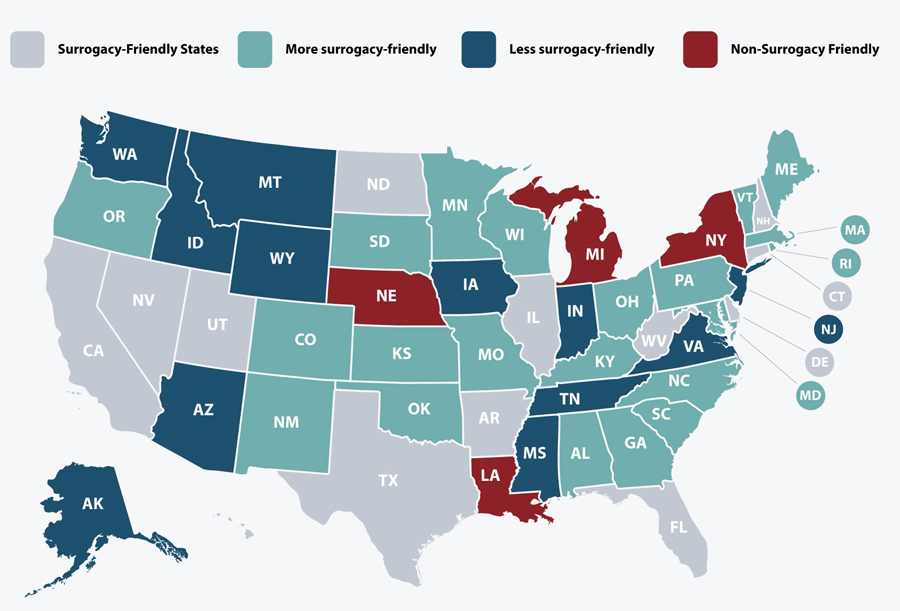Surrogacy in the United States: A Premium Path to Parenthood
Surrogacy in the United States has long been recognized as a premium option for individuals and couples striving to build their families. Known for its comprehensive legal protections, ethical practices, and advanced medical care, the USA remains a top choice for surrogacy journeys despite its higher costs. With surrogacy laws varying widely across the globe, the USA offers peace of mind with transparent processes and a high standard of care.
Why Choose the USA for Surrogacy?
- Comprehensive Legal Protections- The United States provides one of the most secure legal frameworks for surrogacy. Many states offer clear laws that protect both intended parents and surrogates. This transparency ensures that intended parents are recognized as the legal guardians of the child, often before birth. States such as California and Illinois are particularly renowned for their surrogacy-friendly laws, making them hotspots for intended parents globally.
- World-Class Medical Standards- With cutting-edge fertility clinics and experienced professionals, the USA boasts some of the highest IVF and surrogacy success rates globally. Intended parents can rest assured knowing their journey is managed with precision and care. Clinics employ state-of-the-art technology for embryo transfer and genetic screening, ensuring the best possible outcomes.
- Ethical Standards and Screening- Surrogates in the USA undergo rigorous physical, psychological, and background screenings to ensure they are well-suited for the process. This ensures the safety and well-being of all parties involved. Agencies also work to establish clear expectations between surrogates and intended parents, fostering trust and understanding.
The Cost of Surrogacy in the USA
While surrogacy in the USA is among the most expensive globally, the quality of services justifies the investment. Costs typically range from $90,000 to $150,000, covering medical expenses, surrogate compensation, legal fees, and agency costs. For intended parents seeking a secure and high-quality experience, the USA offers unmatched reliability. Financing options and payment plans are often available, helping to make this premium option more accessible.
The Process of Surrogacy in the USA
- Choosing a State
Surrogacy laws vary by state. States like California, Connecticut, and Illinois are surrogacy-friendly, offering favorable legal protections for intended parents. It’s crucial to consult with a legal expert to understand specific state regulations and how they align with your needs. - Selecting a Surrogate
Agencies assist in matching intended parents with surrogates based on shared values and expectations. Surrogates are carefully vetted to ensure compatibility, and many agencies also provide ongoing counseling to support surrogates throughout the journey. - Medical Procedures
IVF is the cornerstone of the surrogacy process, involving the creation of embryos using the intended parents’ or donors’ gametes. These embryos are then implanted in the surrogate. Many clinics offer pre-implantation genetic testing (PGT) to enhance success rates and reduce the risk of genetic disorders. - Legal Contracts
Comprehensive legal agreements protect the rights and responsibilities of both the surrogate and the intended parents, ensuring a smooth process. These contracts cover aspects such as compensation, medical procedures, and post-birth arrangements.
Key Statistics About Surrogacy in the USA
- The USA accounts for approximately 15% of global surrogacy cases annually.
- IVF success rates in leading clinics exceed 70% for women under 35.
- 90% of surrogacy journeys in the USA result in a live birth, reflecting the country’s high standards.
- The demand for surrogacy services in the USA has grown by 17% annually over the past decade.
Challenges in the USA Surrogacy Process
- Cost: The premium price of surrogacy in the USA can be a barrier for many intended parents. However, many view it as an investment in a safe and reliable path to parenthood.
- State-Specific Laws: Navigating varying state laws requires expert guidance to ensure compliance. States like New York recently made strides in legalizing compensated surrogacy, broadening options for intended parents.
- Emotional Complexity: Surrogacy is an emotional journey for all parties. Agencies provide counseling and support to help navigate these complexities.
Why Partner with an Experienced Agency?
Working with a trusted agency like Become Parents streamlines the surrogacy process, from matching with surrogates to navigating complex legal frameworks. Agencies provide invaluable support, ensuring a stress-free experience. They also act as mediators to address any challenges that may arise, ensuring all parties are aligned and supported.
Future Trends in USA Surrogacy
-
Increased Inclusivity: More states are adopting surrogacy-friendly laws, allowing greater access for LGBTQ+ couples and single parents.
- Technological Advancements: Innovations in IVF and genetic testing are expected to further improve success rates and reduce costs.
- Rising International Interest: As surrogacy laws tighten in other countries, the USA continues to attract international intended parents seeking a secure and ethical process.
Conclusion
Surrogacy in the USA stands as a gold standard, combining legal security, ethical practices, and exceptional medical care. For intended parents ready to invest in a premium journey to parenthood, the USA offers unmatched peace of mind and success rates. With the guidance of reputable agencies, dreams of parenthood can become a reality. Whether you are starting your research or ready to embark on this journey, the USA provides a framework that is as reliable as it is compassionate.








 The issue of what it means to be a parent drives the core of the cultural difference on surrogacy. Many societies, especially those with strong religious or traditional values, see parenthood as something related to biology and bloodlines. Bringing a child into the world via surrogacy—where the surrogate might have no genetic relationship to the child—tests these strongly held convictions.
The issue of what it means to be a parent drives the core of the cultural difference on surrogacy. Many societies, especially those with strong religious or traditional values, see parenthood as something related to biology and bloodlines. Bringing a child into the world via surrogacy—where the surrogate might have no genetic relationship to the child—tests these strongly held convictions.



 Look for legal guidance
Look for legal guidance 

